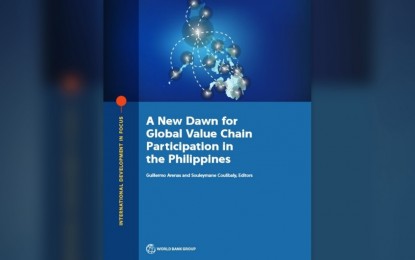
GVC PARTICIPATION. The cover of the World Bank Group's "A New Dawn for Global Value Chain Participation in the Philippines” report that recommends the country to expand its global value chain participation in three industry clusters. The World Bank launched the report in Makati City on Thursday (Oct. 6, 2022). (Screenshot of the report's cover)
MANILA – The World Bank Group has identified three clusters of sectors where the Philippines could expand its participation in global value chains (GVCs) post-pandemic.
The World Bank launched in Makati City on Thursday its report “A New Dawn for Global Value Chain Participation in the Philippines”, providing policy recommendations for the country to attract more investments that would help boost the country’s participation in international trade through sectors where it has the advantage.
“The Philippines has an opportunity to diversify into three GVC clusters that are being restructured by the Covid-19 pandemic,” the report said.
These industry clusters identified by the World Bank are the industrial, manufacturing, and transportation (IMT) sector; the technology, media, and telecommunications (TMT) sector; and the health and life sciences (HLS) sector.
The report noted that the Philippines is already globally positioned in the IMT sector with its strong semiconductor, automotive, and aerospace industries.
Being one of the global leaders in the business process outsourcing (BPO) industry, the Philippines can further expand its GVC participation in the TMT sector.
The HLS, on the other hand, is an emerging sector for the country, the World Bank said.
“The HLS sector could take advantage of the return of health care workers during the Covid-19 crisis and emerging telehealth and telemedicine activities to complement the traditional BPO sector,” it added.
For the country to harness the benefits of expanding its GVC participation in these clusters, constraints related to trade, foreign direct investments (FDIs), and skills along with other bottlenecks in access to financing, high cost of energy, speed of Internet services, and red tape should be addressed.
“Policies are needed to reverse the Philippines’ missed opportunities and strengthen its position in key GVCs. Decisive policy action to ensure that investment is channeled into priority sustainable development sectors has never been so critical,” the World Bank report added.
Department of Trade and Industry (DTI) Secretary Alfredo Pascual said the three clusters identified in the World Bank study are part of the priority industries of the agency.
“Supporting the country’s enhanced participation in reconfigured GVCs is a long-term pursuit that entails addressing structural, systemic, and sector-specific constraints to growth,” Pascual said.
He added that legislation is also in place to help attract FDIs.
These laws passed by Congress in recent years include the Corporate Recovery and Tax Incentives for Enterprises (CREATE) Law and the amendments to the Public Service Act, the Foreign Investment Act, and the Retail Trade Liberalization Act.
“As the country enters the post-pandemic future, implementing an inclusive, sustainable, and resilient industrial policy is imperative to build a more competitive economy. By relying on science, technology, and innovation (STI) and essential digital technologies, industries will be better positioned to face competition in both domestic and export markets and pave the way for industrial transformation,” the trade chief said. (PNA)
